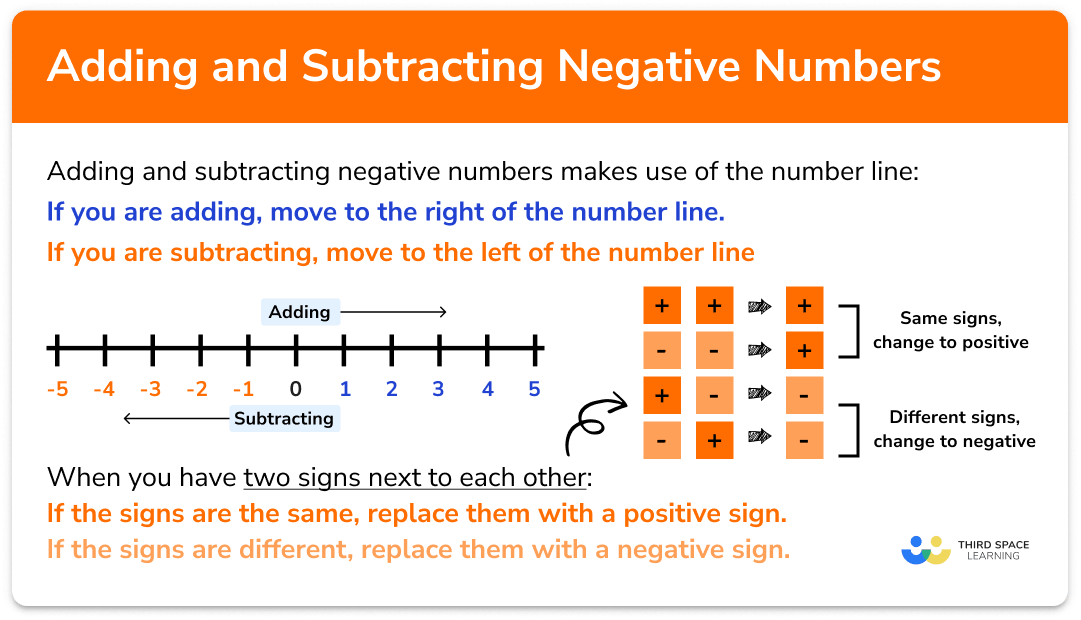Negative Numbers: Taming the Minus Sign Mayhem!
Ever find yourself staring at a negative number, wondering if it's going to bite? Negative numbers can be a bit brain-bending, especially when you need to add or subtract them. But fear not! Mastering this essential math skill is entirely achievable, and once you unlock the secret, you’ll find yourself navigating the numerical world with newfound confidence.
Adding and subtracting negative numbers is more common than you might think. From calculating temperatures to managing finances, these calculations pop up everywhere. Imagine trying to figure out the temperature change from -5 degrees Celsius to 2 degrees Celsius without understanding negative numbers. It's like trying to bake a cake without knowing how to measure ingredients - a recipe for disaster!
The concept of negative numbers emerged relatively late in the history of mathematics. While positive numbers were used for counting and measuring since ancient times, negative numbers weren’t readily accepted until much later. Early mathematicians struggled with the idea of a number less than zero. It wasn't until the 7th century, with the work of Indian mathematician Brahmagupta, that negative numbers started to gain recognition. He developed rules for arithmetic operations involving negative numbers, paving the way for their wider acceptance.
A key issue people face with negative number arithmetic is understanding the double negative. Subtracting a negative number is equivalent to adding its positive counterpart. This concept is often a stumbling block for beginners, but with practice, it becomes second nature. Imagine subtracting a debt – it’s the same as adding money to your account.
Let's define our terms. A negative number is any number less than zero, represented with a minus sign (-) in front of it. Subtracting means taking away, and adding means combining. So, how do we apply these concepts to negative numbers? When adding a negative number, you're essentially moving further down the number line in the negative direction. For example, 5 + (-3) is the same as 5 - 3, which equals 2. When subtracting a negative number, it's like removing a debt, which results in a positive increase. For example, 5 - (-3) is the same as 5 + 3, which equals 8.
Understanding negative number arithmetic offers several benefits. Firstly, it strengthens your overall math skills, building a solid foundation for more advanced mathematical concepts. Secondly, it enhances your problem-solving abilities in various real-world scenarios, such as budgeting, financial analysis, and scientific calculations. Finally, it opens up opportunities in fields that require strong mathematical proficiency, such as engineering, finance, and computer science.
Here's a simple action plan: First, visualize a number line. Second, remember that adding a negative is like subtracting a positive. Third, practice with various examples. A successful example: -2 + (-5) = -7. You moved further into the negative territory.
Frequently Asked Questions:
1. What is a negative number? A: A number less than zero.
2. How do I add two negative numbers? A: Add their absolute values and keep the negative sign.
3. How do I subtract a negative number? A: Change the subtraction to addition and change the sign of the second number.
4. Why is subtracting a negative the same as adding a positive? A: It’s like removing a debt, increasing your overall value.
5. What is the number line? A: A visual representation of numbers, extending infinitely in both positive and negative directions.
6. What are some real-world uses of negative numbers? A: Temperature, finances, altitude, etc.
7. How can I practice working with negative numbers? A: Use online resources, textbooks, and practice problems.
8. Where can I find more information about negative numbers? A: Khan Academy, math textbooks, and online math forums.
Tip: Think of negative numbers as representing a debt or a decrease. This can help you conceptualize the operations better.
In conclusion, mastering the art of adding and subtracting negative numbers is a crucial skill that empowers you to navigate mathematical concepts with confidence. From everyday calculations to complex scientific endeavors, this fundamental skill opens doors to a world of understanding and practical application. The initial confusion surrounding the minus sign can be overcome with practice and visualization. By embracing the challenge and utilizing the strategies outlined here, you'll unlock a deeper understanding of the number system and its many applications. Don’t be afraid of the minus sign – embrace its power and unlock your mathematical potential! Start practicing today, and you'll be surprised at how quickly you conquer the negative number maze.
Navigating the exchange 50000 pesos chilenos en soles
Taking control your holistic guide to dengue fever prevention langkah pencegahan demam denggi
Why does my lower back hurt understanding porque me duele la parte baja de la espalda














